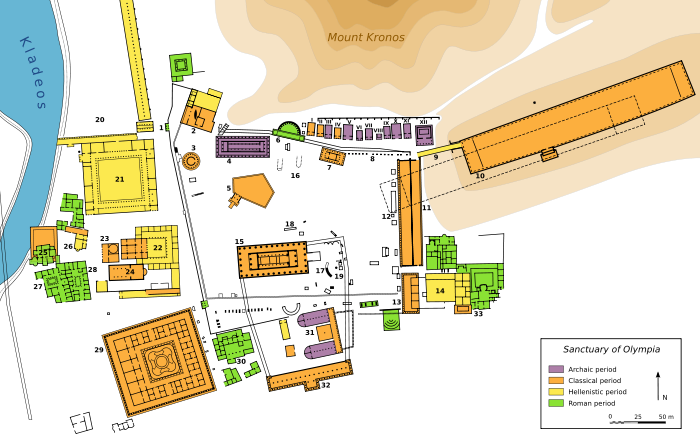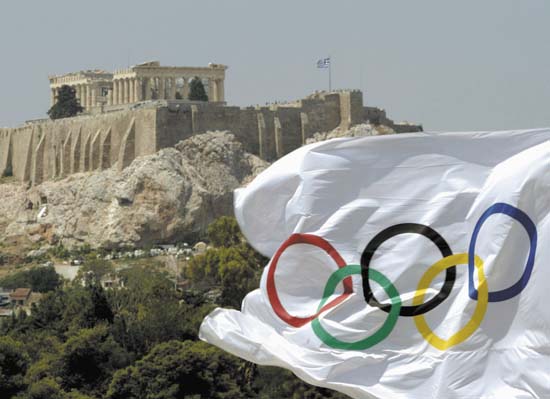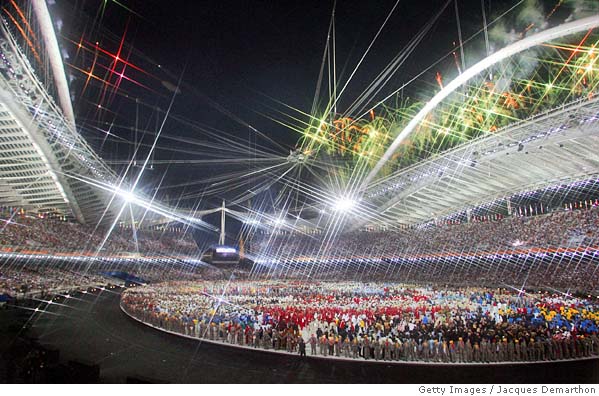Posted at Dec 09/2007 06:30PM:
D.M.
Posted at Dec 10/2007 09:12PM:
The Olympic Games started in 776 B.C. in the Ancient Greek sanctuary of Olympia and lasted until 393 AD when Theodosius I banned them in order to promote Christianity. They took place every four years, an Olympiad. Out of all the sporting festivals, Pythian Games (Delphi), Nemean Games (Nemea), and Isthmian Games (near Corinth), the Olympic Games were the most famous. How the games began is a mystery…texts attribute its origin to myths, the most popular is that Heracles won a foot race at Olympia and required Olympia to repeat the race every four years to honor his father, Zeus.
The only event at the first games was the stade, a 210 yard long race. Stade is also the origin of the English word stadium. Later on more events were added, as you may have guessed as we have all seen modern day Olympic games. Next came the diaulos, somewhat like a 400 meter race and later a dolichos, which consisted of longer races that ranged from 1,500 to 5,000 meters. Soon after came wrestling and the introduction of the pentathlon, a five event competition consisting of the long jump, discus throw, footrace, wrestling and javelin throw. The Olympic games continued to grow as the number of events increased and the festival went from 1 day to 5 days and so on. The last day was a day of celebration and devotion to Zeus. The Olympic games grew to include: boxing, pancratium (no hold bared fighting), chariot and horse races that took place in the hippodrome just south of the stadium.
The competitions were restricted to only freeborn Greeks. They took place in Olympia’s stadium and hippodrome. As time went on and Greece became more successful on a global stand new buildings were built in Olmypia in support of the games or in relationship with them. However, some things did not change with time, athletes still participated in the nude, which baffles scholars of the modern day. Although many game to participate in the games, no women or non-Greek speaking peoples were allowed to participate. Women could enter their horses or chariots in the chariot races, but that was their largest part in the games. This did mean that they shared in victory if they won, and many did. Furthermore, athletes trained for these events rigorously for years and years for only a wreath or garland if they won. The real prize was the title that came with winning and social status you were perceived with. In addition, the games continued to occur every four years. Countries stopped waging wars to observe the games, that is how important they were. One day you are fighting against a nation for land and wealth, and you stop that to participate in the games against them in a civilized manner. Olympia being a sanctuary helped because it became extremely wealthy and seen as an extremely important religious staple in the ancient world. Many countries competed and fought over Olympia for the political influence and wealth associated with the city and the games.

Posted at Dec 10/2007 09:19PM:
1: North-East propylon – 2: Prytaneion – 3: Philippeion – 4: Temple of Hera – 5: Pelopion – 6: Nymhi of Herodes Atticus – 7: Metroon – 8: Zanes – 9: Crypt (arched way to the stadium) – 10: Stadium – 11: Echo stoa – 12: Building of Ptolemy II and Arsinoe – 13: Hestia stoa – 14: Hellenistic building – 15: Temple of Zeus – 16: Altar of Zeus – 17: Ex-voto of Achaeans – 18: Ex-voto of Mikythos – 19: Nike of Paionios – 20: Gymnasion – 21: Palaestra – 22: Theokoleon – 23: Heroon – 24: Phidias' workshop and paleochristian basilica – 25: Baths of Kladeos – 26: Greek baths – 27 and 28: Hostels – 29: Leonidaion – 30: South baths – 31: Bouleuterion – 32: South stoa – 33: Villa of Nero
Treasuries. I: Sicyon – II: Syracuse – III: Epidamnus ? – IV: Byzantium ? – V: Sybaris ? – VI: Cyrene ? – VII: Unindentified – VIII: Altar ? – IX: Selinunte – X: Metapontum – XI: Megara – XII: Gela
Unfortunately, the games became doomed when Greece succumbed to Rome in the 2nd century AD. The Romans never participated in the games, but realized their importance and kept them around for that reason. However, the Romans viewed the games as public affairs and an opportunity for festival. A more spectator favored outlook you could say. The Greeks focused mainly on the competitors taking place in the games, and held the games as the highest competitions amongst men at the time. The games were a place where heroes were born and men tested themselves beyond imagination. As Roman influence continued to grow with time, the Olympic Games were done away with. Emperor Theodosius I banned the games in 393 AD in order to promote Christianity. He deemed the games equivalent to paganism and had them done away with.
But the Olympic Games and what they represented were too strong to be kept down. It took a long time, but in the mid 1800’s the Greek Revival Movement helped spawn the idea to bring the Olympic Games back. Long story short, the Olympics are back and better than ever. There is an impressive amount of competitions ranging from ski shooting to the original footraces held at Olympia 3000 years earlier. The competition is open to all people, and is seen as one of the highest honors an athlete can ever achieve; being chosen by your country to represent your people on the biggest stage in the world. The games have been split into the summer and winter, which are held every 4 years starting two years apart (summer Olympics, 2 years later winter, 2 years later summer, etc…). The Olympic Games have evolved into a healthy stage for the highest level of competition. The Games promote peace and healthy competition among other values. They have been extremely successful in their return and are a universally unifying event all people can be apart of and enjoy.

2004 The Olympic Games returned to Athens as seen here with the olympic flag and parthenon in the background.

Olympic stadium at Athens, a little bit of an upgrade from Olympia's.
